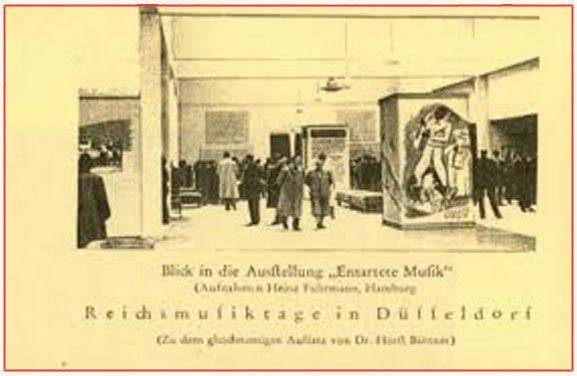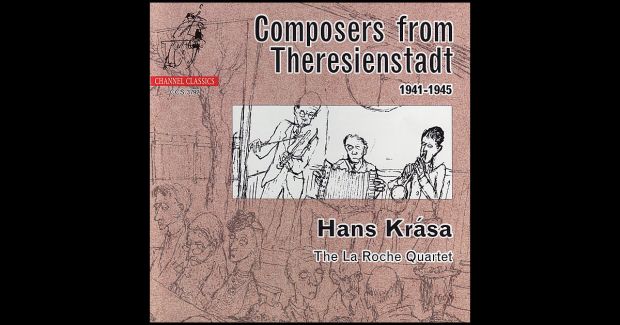 At the end of the 1980s the music-loving world (and here I mean not only listeners, but also publicists, reviewers and music experts) found out that there was more between heaven and earth, or, since we are talking about music: between Strauss and Stockhausen. People began to realise that an entire generation of composers had been deleted from the history books and concert halls. Just like that. And it was not _only_ the fault of the Nazis.
At the end of the 1980s the music-loving world (and here I mean not only listeners, but also publicists, reviewers and music experts) found out that there was more between heaven and earth, or, since we are talking about music: between Strauss and Stockhausen. People began to realise that an entire generation of composers had been deleted from the history books and concert halls. Just like that. And it was not _only_ the fault of the Nazis.

In 1988, the exhibition ‘Entartete Musik’ was put on in Düsseldorf, exactly 50 years after the original event held by the Nazis. The exhibition also traveled to other cities, including Amsterdam, and became the occasion of much discussion.

The term ‘entartet’ (degenerate) was not invented by the Nazis. Already in the nineteenth century it was used in criminology, meaning something like ‘biologically degenerated’. The term was eagerly borrowed by the rulers of the Third Reich to prohibit the expressions of art that they considered ‘non-Aryan’. Modernism, expressionism, jazz … And everything that had to do with Jews, because they were already seen as a degenerate race.

What had begun as a ban soon developed into exclusion and resulted in murder. Those who had managed to flee to America or England have survived the war. Those who stayed in Europe were doomed.
Many, mainly Czech composers were deported via Terezín to the extermination camps, many ended up there directly. After the war they were totally forgotten, and thus murdered for the second time. Those who survived were found hopelessly old-fashioned and no longer played.
It was only at the end of the 1980s that it became clear that Korngold was more than a composer of Hollywod scores; that without Schreker and Zemlinski there would probably have been no Strauss either and that Boulez and Stockhausen were not the first to experiment with serialism. The turnaround came too late for most of the survivors …
In Germany the foundation Musica Reanimata was established, but the Netherlands did not stay behind either. Under the name Musica Ritrovata a few enthusiasts have tried to bring the music back to the concert halls.
That this succeeded was partly thanks to Channel Classics. The Dutch CD label, founded by Jared Sachs was the very first to record the music of forgotten composers.
Already in 1991 and 1992 they released four CD’s with music of the ‘Theresienstadt – Composer’ of whom one had almost never heard before: Gideon Klein, Hans Krása, Pavel Haas, Viktor Ullman… Even though the last three were really household names before the war. Gideon Klein had not had the chance – he was murdered in the gas chambers at the age of 24.
HANS KRÁSA

The first four Channel Classics CDs were truly pioneering. Hans Krása’s child opera Brundibar was recorded in Prague. Brundibar was actually composed before the war, but its premiere took place in Terezín, in 1943.
The CD (CCS 5198) was combined with songs by Domažlicky. Not a high-flyer, but certainly interesting.
On the other hand, the recording of Krása’s chamber music by the La Roche Quartet (CCS 3792) is great, probably the best performance of it.
PAVEL HAAS

Of all Janácek’s students, Pavel Haas succeeded best in combining the influences of his teacher with his own musical language. At the request of the bass Karel Berman, he wrote Four Songs on Chinese Poetry in 1944. Berman, who survived the war, recorded them together with his own songs (CCS 3191).
Karel Berman sings ‘Far Away Is The Moon Of Home’:
GIDEON KLEIN

But the best thing, in my opinion, is the recording with four works by 24-year-old Gideon Klein and Victor Ulmann’s third string quartet,. Listen to Klein’s Trio and shiver (CCS 1691)
SCHULHOFF, WOLPE AND KOFFLER. AND MORE

Channel Classics continues, now in collaboration with the acclaimed Werner Herbers and his Ebony Band. Thanks to Herbers many composers have become more than just a Wikipedia entry. Think of Schulhoff: you do know his CD with Dada-inspired works, with Otto Griebel’s drawings, don’t you?
The Ebony Band plays H.M.S.Royal Oak, Schulhoff’s jazz oratorio:
Think of Stefan Wolpe, of whom Herbers performed the opera Zeus und Elida during the Holland Festival in 1997 and whose music he still records: the latest CD is called Dancing.
Ebony Band plays ‘Tanz (Charleston)’ by Wolpe:
Besides compositions by Wolpe, Milhaud and Martinů it inlcudes works by Emil František Burian and Mátyás Seiber.

And think of the Polish composer Józef Koffler, the first Polish composer who used the dodecaphony. Koffler, together with his family, was murdered by the Nazis, probably in the city of Krosno. His String Trio and the beautiful cantata Die Liebe (sung by Barbara Hannigan) are combined with the Quintet of the other unknown Pole, Konstanty Regamey (CCS 31010).
Koeffler’s ‘Die Liebe’ (Miłość):
Translated with http://www.DeepL.com/Translator
In Dutch:
Entartete Musik, Teresienstadt en Channel Classics
Auf Deutsch:
Entartete Musik, Theresienstadt und Channel Classics. Deutsche Übersetzung
For more ‘Theresienstadt-composers’
“Ich möcht so gern nach Haus!”: Anne Sofie von Otter zingt liederen van ‘Theresienstadt componisten’
Das Lied von Terezín & Requiem Ebraico
Rudolf Karel, een ‘Theresienstadt componist’ die vrijwel niemand kent


Very very interesting
LikeGeliked door 1 persoon
Thank you!
LikeLike
This essay brings names mostly unknown at least to this reader. And they, thanks to your post, Basiu, become, as they should, alive again.
Thank you.
Dorota
LikeGeliked door 1 persoon
Vanochtend deel van de strijktrio van Klein in de ‘Spiegelzaal’ gehoord samen met muziek van Moshe Weinberg. Fantastische muziek, als je ook nog bedenkt waar het geschreven werd…
LikeGeliked door 1 persoon
door wie werd het gespeeld? Jammer genoeg gemist..
LikeLike
Haagse String Trio, ik zat 1m van de cellist, fascinerend.
Kon ik maar zo spelen
LikeGeliked door 1 persoon
Thank you for this interesting article. My late husband Dr. Peter Girth created the Düsseldorf exhibition Entartete Musik in 1988, he was Intendant Düsseldorfer Symphoniker and Tonhalle then, he passed away in 1997 in Frankfurt.
LikeGeliked door 1 persoon